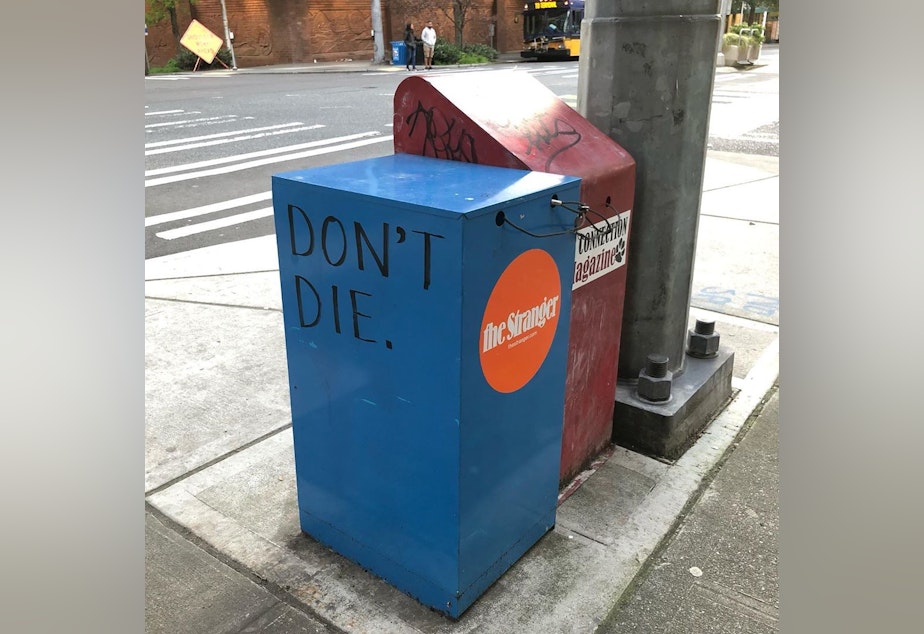‘We sent out an SOS.’ Seattle’s Stranger in the fight of its life

The coronavirus pandemic has had a devastating impact on many businesses: restaurants, retail and the service industry as a whole.
It has also had a major impact on journalism, especially smaller newspapers like The Stranger in Seattle, which laid off 18 employees in March.
Tim Keck is president of Index Newspapers, the parent company of The Stranger and The Portland Mercury.
This interview has been lightly edited for clarity.
Can you tell us more about the impact on The Stranger?
For a publication like The Stranger, the majority of our revenues come from other small businesses. It's mostly arts organizations, restaurants and clubs, which have all been impacted by the virus, which in turn impacts us because we survive off their advertising dollars. We also have our own events, which have all been canceled.
We also run a local ticketing company. As you can imagine, there's not a lot of tickets being sold right now. Those three things together have been have had a huge impact on our revenues.
Events being canceled and all those businesses and advertisers you're connected with--I know you've worked with many of them for quite a few years-- it must be really hard to see them take a major hit like this.
Sponsored
It's tragic. So many restaurants and bars and clubs and arts organizations already live right on the edge of survivability. This has been a hurricane for them.
We're really concerned about this going forward, of what the arts and small business scene in Seattle -- which gives Seattle its flavor, its life, its soul -- will look like after the virus has gone.
I understand that you started a fundraising campaign. How much support has The Stranger received so far?
It's been amazing. The Stranger doesn't have a paywall on its website. We have a pay-if-you care-to kind of model, which we've never really pushed that much. It hasn't been a big part of our life.
When the virus started affecting us so drastically, we sent out an SOS asking people if they like what we're doing to contribute. We've had over 6,000 reader contributions in the last month, totaling over $200,000.
Sponsored
That revenue was really the difference between life and death for us. It gave us a moment to be able to collect ourselves, to be able to start figuring out how to survive in this new environment, not only just on an economic level, but on an emotional level as well.
When we put up the ask, we didn't know what we'd get. We were just astonished. It was so wonderful that our readers came to our rescue that way. We're just so grateful. It really gave everybody in the organization, a real desire to do a great job.
That kind of direct support, is that going to continue?
We’ll continue to do it. We're doing some interesting things, as well. We picked different organizations, some small businesses, or groups of small businesses, that we want to support with advertising.
For every dollar that reader puts in, every week, we have three new organizations that will give free advertising in that same amount. Every week, we'll be doing that.
Sponsored
As you're looking around and seeing how this pandemic is hitting small newspapers, and talking to other publishers around the country, what is that conversation like?
It's pretty dire. Newspapers are kind of like the people in the community who are the most vulnerable to the virus.
They have a pre-existing condition. Newspapers, in general, don't have much of a business model. They rely on local advertising. They're in competition with Facebook and Google. With the virus, this has made that situation so much more dangerous for them.
I'm hopeful that this won't be the case, but my guess is that you'll see lots of local media, not just the alternatives, but also large Metro newspapers, taking a huge hit, even though there's such a high demand right now for their content.
There already wasn't much of a business model. Now, there's no business model at all.
Sponsored
It’s an open question when things will get back to some kind of new normal, but once they do, how do you think The Stranger is going to look in the future? Will it be different?
We're going to try to be as good of a paper as we possibly can. It's really difficult to see what the new normal will be.
I think there's going to be a long period of time in between when people can start coming back together and that there's an advertising base that can support a publication like The Stranger. I think that once people start to gather, I don't think it'll be like a light switch which will click back on and our business will start to happen. I think that we're going to have to evolve as the situation evolves, as people come back.
I can’t imagine we’ll be exactly the same when we come back. We're going to do what we've been trying to do through this whole thing, which is evolve, and try to survive for as long as we can.
Is there a moment in this crisis, so far, that you think is going to stay with you, a defining moment where something changed for better or worse?
When we did layoffs last month, it was surreal and horrible. We let go some incredibly talented people. That day was so horrible. That's gonna be the one that sticks out in my mind the most.
That was the worst day of my working career. But, we're working like crazy to try to get as many people back as possible.
Listen to the interview by clicking the play button above.





